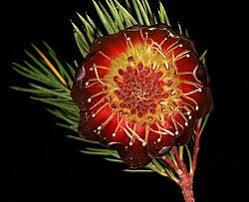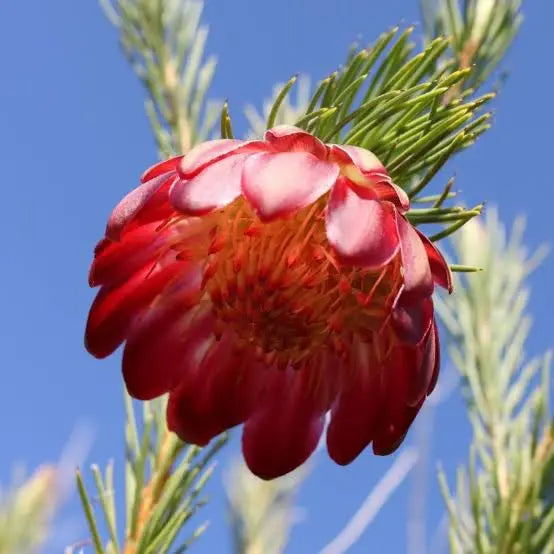Protea nana
Protea nana
Couldn't load pickup availability
Protea nana, also known as the mountain rose or dwarf sugarbush, is a compact, flowering shrub endemic to the mountains of South Africa's Western Cape province. It is known for its beautiful, drooping, bell-shaped flowers and needle-like leaves
- Flowers: The pendulous, cup-shaped flowers typically range in color from bright red to crimson, though pale green and burgundy variations can occur. The flowers have a distinct, yeasty odor and are pollinated by small mammals, such as rodents and shrews, which are attracted to the smell and nectar.
- Leaves and branches: The leaves are green, soft, and needle-like, curving upward from the branches. Young branches are green before turning red and eventually brown as they mature.
- Growth habit: This is a densely branched, roundish shrub that reaches about 1.3 meters in height. The branches curve gracefully outwards when bearing blooms.
- Lifespan: While it grows quickly, Protea nana is a relatively short-lived species, typically lasting about 10 years in cultivation.
- Location: The mountain rose is endemic to the fynbos biome of the Western Cape in South Africa, including the Groot Winterhoek, Du Toits Mountains, and Skurweberg areas.
- Growing conditions: This species requires well-draining, acidic soil and full sun.
- Difficulty: It can be difficult to cultivate in a typical garden setting and is best grown in containers, raised embankments, or rock gardens where the downward-facing flowers can be enjoyed.
- Tips: When caring for it, ensure good air circulation, water regularly during the growing season, and use a low-phosphorus fertilizer
Price is for 5 seeds
- Elevation: It thrives on mountain slopes at altitudes of 400 to 900 meters.
- Soil: It grows in slightly acidic soils that are typically low in phosphorus, including both dry sand and moist, peaty loam.


Collapsible content
Fair Use Disclaimer
Our website may contain content not authorized for use by its owner but use of this material falls under the guidelines of fair use (They are for educational purposes only to show the plant only).
If you want to find our more or own any images displayed on our website and disagree with our assessment it constitutes 'fair use' please click here.


